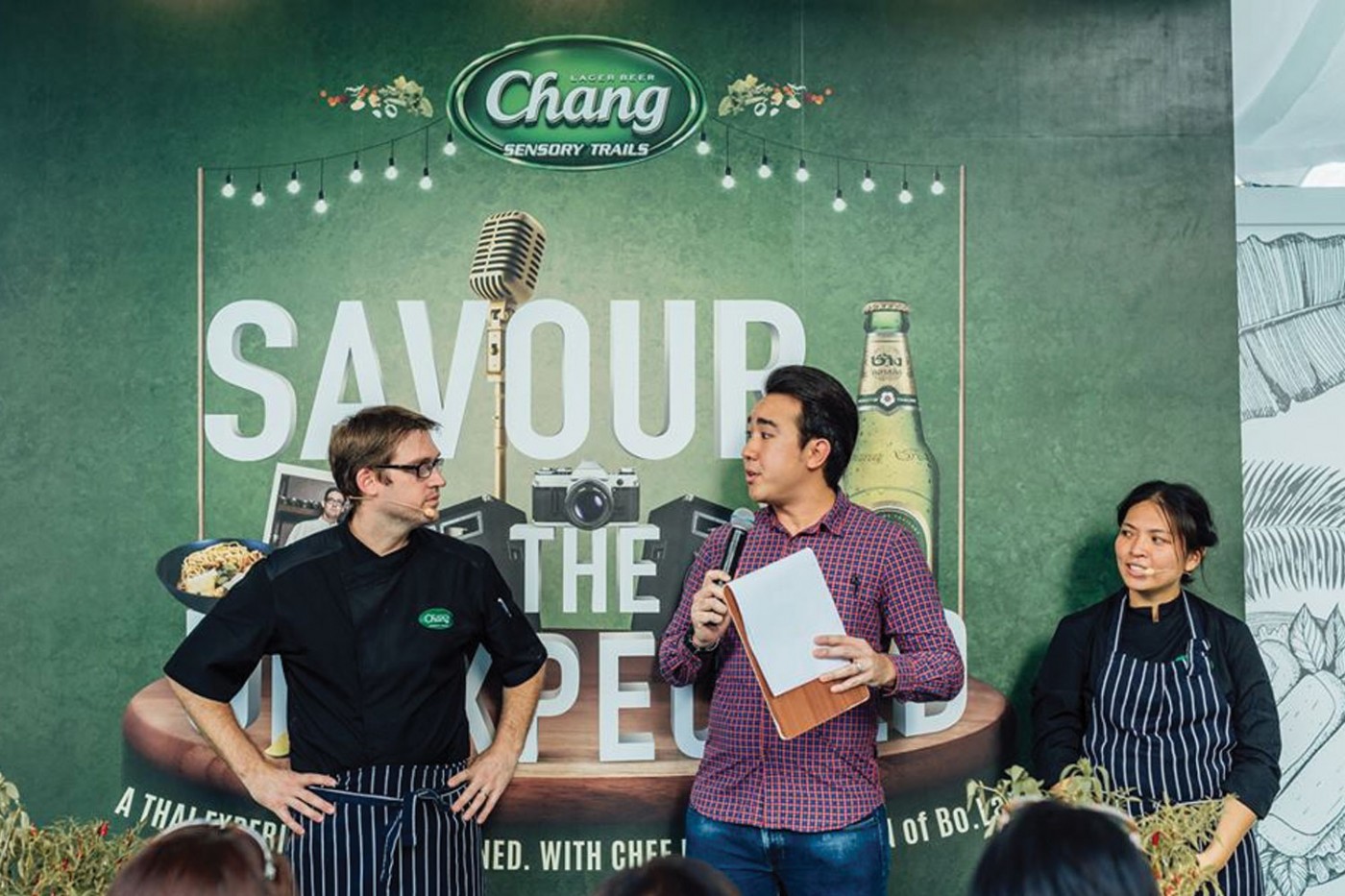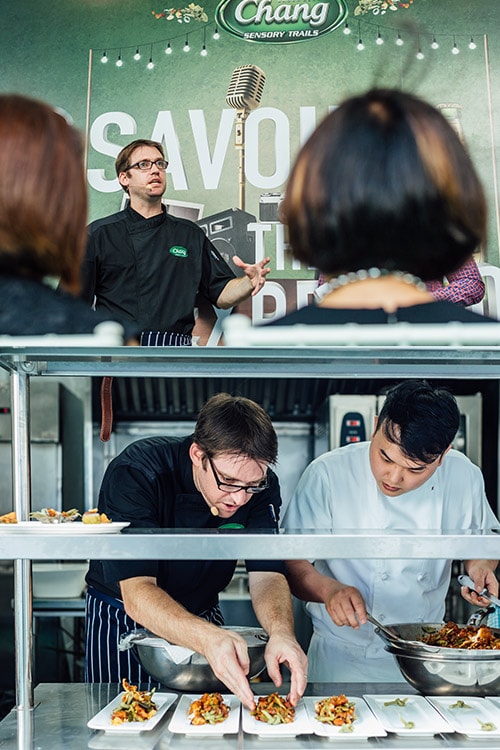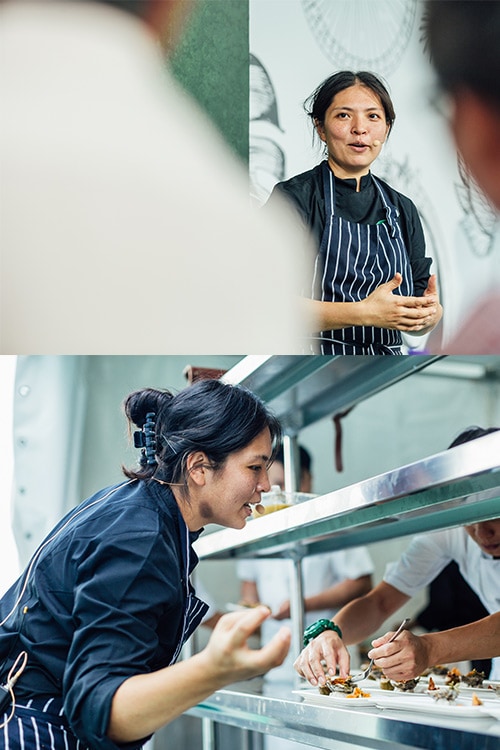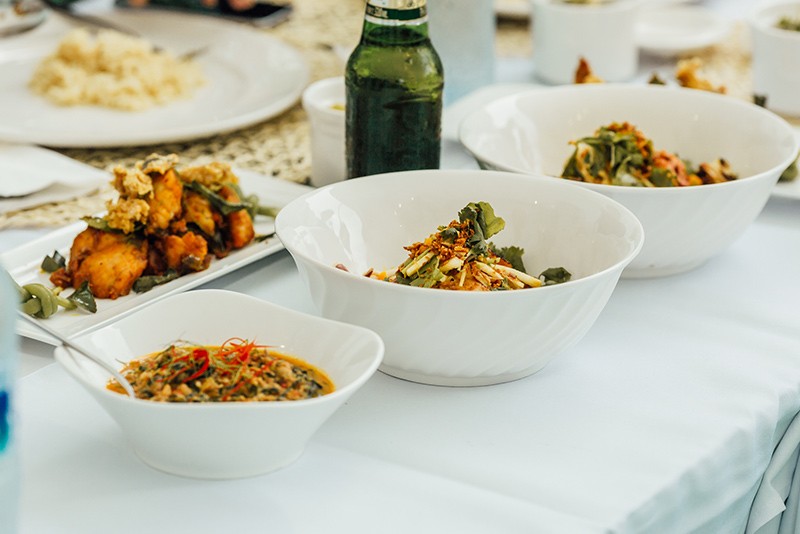Chefs Bo Songvisava and Dylan Jones Aim for Zero Carbon Footprint at Bo.lan
Most gourmands, blessed with deeper pockets, visiting the bustling city of Bangkok would make an additional effort to get on the elusive diners list for Gaggan (recently announced to be shutting its doors in 2020) and Nahm. Bo.lan, a traditional Thai establishment with fine-dining flair is lust-worthy as well, earning itself the 19th spot in Asia’s Best 50 restaurants this year.
Recently at Long Chim for a press lunch showcasing a special menu inspired by memories, I basked in the good fortune of being fed by the duo, Thai-born chef Bo Songvisava and Australian-born chef Dylan Jones, sans accumulating air miles. Bo launched spontaneously into a tale of lowly staff meals in London. She confessed to squirrelling scraps of leftover ribs and bones to make a humble soup that successfully relieved her of hunger, bordering on starvation. The harsh realities of kitchen life, romanticised into a bowl of steaming broth—I couldn’t wait.
The moment the Leftovers Made Good kissed my lips, I broke into a sweat.
I deliberated whether to squeeze in another slurp of the Hot and Sour Soup of Pork Ribs and Pickled Mustard Greens. Brash flavours that deliver a skull-tingly sort of heat was not agreeable to my docile palate. The additional spoonfuls of organic rice ingested just to counteract the spice, weighed heavily in my stomach. Sure, I was an adventurous diner, and the looming presence of the ice-cold Chang beer bottle at the table extended a helping hand. However, I decidedly lowered down my cutlery in silent defeat.
Bless their souls for the Sweet Bites, Sweeter Memories to punctuate the meal—mock rubies in perfumed jasmine syrup and oven-smoked biscuits blotting out the scorching effects of the authentic Thai meal served earlier.
Chef Bo and Dylan’s visit to Singapore is in conjunction with the Chang Sensory Trails, their third pit stop, after London and San Francisco. The duo likes a bit of contrived mischief and following a quick chat at the poolside surrounded by lush greens from a sky garden, I learn more about their maniac fixation with the ‘zero carbon footprint’ movement they were so adamant on implementing in their restaurant.
****
HNW: How did both of you start your respective culinary journeys?
DYLAN JONES: I started in school studying food. Once I finished, I knew instantly that I didn’t want an office job. My eagerness to travel resulted in me applying for an apprenticeship in Australia, which led to my second job in Melbourne. I was at that stage of my life where I decided to pursue my real interest in food, so my fervour brought me to London where I worked at Nahm under David Thompson. I fell in love with Thai food and a Thai woman… and the rest is history.
BO SONGVISAVA: I have always loved cooking. In fact, I think about food all the time. My mum and dad cook, and even though they aren’t professional chefs or anything, their cooking comes from the heart. And having that kind of exposure inspired me to take on a culinary job, despite strong objections from the both of them. I worked in a hotel kitchen, and juggled between cooking and writing my thesis on Thai Food. It didn’t take me long to realise that I knew nothing about Thai cuisine—so, I packed my bags and went off to London in search of work in a Thai Restaurant.
Why London?
BO: It’s very hard to acquire knowledge in Thailand. When you ask the old people to teach you, they are usually very reluctant to tell you their secrets. Often, they would treat me as though I was a young kid, and tried their best to discourage me from stepping into the kitchen.
During the initial phases of opening a restaurant, (seeing that the both of you come from such different backgrounds) was it difficult to align your craft, knowledge of ingredients and techniques?
DYLAN: No, we had a pretty good understanding of our goals from the start. In fact, it’s even harder now. When we started the business, we had a very clear vision of our interpretation of Thai food. It just took a lot of sheer determination to kick things off the ground. Subsequently, we were too busy to worry about the different directions.
BO: The core philosophy of Bo.lan was very much hashed out. It’s the operational details that we fight about, and sometimes when we plan the menu.
Was the goal to change the stereotypical perceptions of Thai cuisine? What are some of them?
DYLAN: One of the biggest misconceptions for me, is that Thai food is cheap. Any cuisine, when done properly, should not be cheap; it shouldn’t necessarily be expensive either. But when you’re using good quality ingredients and take the time to prepare it, they do come at a cost.
BO: People, in general, think that Thai food is flexible—you can remove a core ingredient or add something more, as and when you like. Contrary to belief, Thai food has structure. When you remove a certain ingredient from the equation, it won’t be the same anymore. If you reduce the spiciness, it won’t do the dish justice. Thai recipes shouldn’t be modified, and people should respect each ingredient.
DYLAN: Pad Thai doesn’t define Thai cuisine.
Bo.lan is very big on zero carbon footprint. What inspired this cause? And do you feel that it is a movement that will inspire other businesses in Thailand?
BO: We take our ingredients and produce very seriously. Since all our food comes from nature, if we don’t take care of our nature and environment, we will have nothing left. And the zero carbon footprint is a terminology used to capture people’s attention. The underlying fact is that we must act on it via our cooking and eating activities. We believe that every bite we eat has an impact on the environment.
DYLAN: We first try to look for the best product; if not, organic produce to improve sustainability. The people who provide food to us are also very important. We started relationships with many of our producers after hearing their stories, and there’s a need to support these people and their livelihood. To step into the zero carbon footprint business is a no-brainer, because the world is pretty f***** up right now and we need to do something about it. Since we are industry leaders in our city, we felt compelled to take up the responsibility of starting this campaign before preaching the word. We try to lead by example, by talking to the young cooks in our kitchen and our kids, because we don’t want them to grow up and become wasteful and disrespectful to the environment.
BO: Currently, we run a couple of activities in the kitchen. We “recycle” our old oil that we use for frying, and make it into soap. We use that to wash our hands in the kitchen or hand them out as gifts for guests to take home.
DYLAN: Well, that’s if they don’t mind having their hands smell like deep fried shallots.
BO: If you sell the oil to people who want to buy it at the restaurant, they will resell it to hawkers and that is a cancer starter. Some of them turn it into animal feed to fatten the stock up, and these creatures end up on your plate. We want to bring a stop to this vicious cycle.
DYLAN: We are also big on reducing the usage of plastic bag use in the kitchen. It’s not very significant but it does make a difference. It’s funny that in Thailand, when you get a drink, you get it in a plastic bag, with a plastic cup and straw, and another plastic bag to hold that plastic bag. It’s incredibly wasteful.
BO: Our newest project is a new form of plastic wrap. We use bee’s wax linen which we painstakingly make ourselves.
DYLAN: The kitchen staff secretly hates us; we give them so much additional work.
BO: That really decreases our plastic usage. We also separate our waste, in a manner to promote recycling—all the fruit go one way, while the leftovers go the other. We then blend the fruit, strain it and add baking soda and sugar. After leaving that to ferment, the mixture becomes an active micro-organism and it works marvellously as a cleaning agent, on uniforms and all. It is odourless as well.
DYLAN: Think about it, in the long run, you save on cleaning fees. Once you have the systems in place, it’s really easy to follow.
Being Chang Chef Ambassadors, you’ve travelled to London and San Francisco where you got to curate the menus of several Thai Restaurants. Can you share your thoughts on how Thai cuisine in these cities differ?
DYLAN: Thai cuisine is very specific to where it is. There are two things that affect it, one is the local market and how evolved their palates are. The second is the ingredients that are available. The further you are from tropical Asia, the harder it is to produce Thai food. You need to have a mutual understanding of who you are as a restaurant and what the collaboration kitchen can produce. It would be foolish to conceptualise an amazing vivid menu of items that they cannot reproduce. You’ve got to be mindful of that.
Do Singaporeans have an appreciation for Thai Food?
BO: I would say not too bad. We get a lot of Singaporeans who travel to Thailand for the long weekend or public holidays. I think your exposure to Thai cuisine is rather good and the ingredients needed in Thai cuisine are readily available in Singapore. It’s just like any market, where some people are super educated and tolerant of spicy and authentic Thai food, while the rest are super averse to spice.
Hero Image credit: Chang





